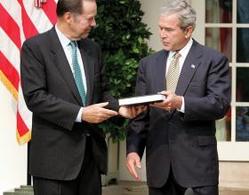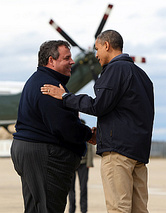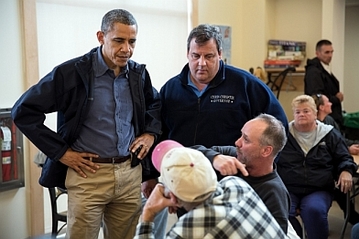-- New Jersey Timeline 2000-
|
* Home
* History * Population * Government * Politics * Lobbyists * Taxes * State Symbols * Biographies * Economy * Employers * Real Estate * Education * Recreation * Restaurants * Hotels * Health * Environment * Stadiums/Teams * Theaters * Historic Villages * Historic homes * Battlefields/Military * Lighthouses * Art Museums * History Museums * Wildlife * Climate * Zoos/Aquariums * Beaches * National Parks * State Parks * Amusement Parks * Waterparks * Swimming holes * Arboretums More... * Gallery of images and videos * Fast Facts on key topics * Timeline of dates and events * Anthology of quotes, comments and jokes * Links to other resources |
Timeline * Prehistoric-1699 * 1700-1749 * 1750-1799 * 1800-1849 * 1850-1899 * 1900-1949 * 1950-1999 * 2000- 2000 - Governor Whitman resigns on January 31 to accept appointment by President Bush as administrator of the US Environmental Protection Agency. She is succeeded as governor by Republican Senate President Donald DiFrancesco under the state constitutional provision then in effect providing that the Senate President fills a vacancy in the office of governor while concurrently serving as head of the Senate. - US Senator Frank Lautenberg announces he will not seek re-election. Jon Corzine, a former co-chairman and partner of the Goldman Sachs investment banking firm, wins the Democratic nomination for the Senate over former Governor James Florio. Corzine defeats Republican Congressman Bob Franks by a 4% margin in the general election, receiving only 50.1% of the total vote despite spending $63 million on his campaign--the most ever spent on a US senate race to that point--compared to the $6 million spent by Franks. - New Jersey Senator Bill Bradley, who announced as a presidential candidate for the Democratic nomination in 1999, ends his campaign in March after failing to win any of the first 20 primaries and caucuses. Bradley endorses Vice President Al Gore, who secures the nomination. In the general election, Gore easily wins New Jersey's 15 electoral votes, receiving over 56% of the vote to 40% for Texas Governor George W. Bush. 2001 - Acting Governor DiFrancesco announces in April that he will withdraw as a candidate for the Republican gubernatorial nomination in the June primary election after media reports raised ethical issues over his past legal and business dealings. Under state law, he designates former Congressman Bob Franks as his replacement on the primary election ballot. In the June primary, Franks is defeated by former Jersey City Mayor Bret Schundler, whose conservative support overcomes the backing for Franks by most of the party organization's leaders. Woodbridge Mayor and former state Senator James McGreevey is nominated as the Democratic candidate.
 USS New Jersey USS New Jersey
- In October, the USS New Jersey, which had been decommissioned in 1991 and mothballed in Bremerton, Washington, opens as a museum and memorial in Camden, a site selected by the Navy after reviewing competing proposals from Bayonne and Jersey City.
- After a campaign largely overshadowed by public and media attention on post-9/11 developments, on November 6 James McGreevey is easily elected governor with 56% of the vote, defeating Republican Bret Schundler. - On December 11, President Bush announces that he is nominating Christopher S. Christie, a former Morris County freeholder and a major fundraiser for Bush's presidential campaign, as US Attorney for New Jersey. After his confirmation by the Senate, Christie takes office in the following month. during his tenure, he focuses on government corruption, obtaining convictions or guilty pleas from 130 public officials. 2002 - During his term, McGreevey signs legislation which raises the tax on the sale of cigarettes; increases income tax rates on higher-income taxpayers; recognizes domestic partnerships; and establishes the Highlands Council to create a master plan and regulate water resources in the northwest region of the state.
- On December 15, President Bush appoints former Governor Thomas H. Kean, then president of Drew University, to chair the national commission to investigate the 9/11 terrorism attacks.
2004 - On July 22, the 9/11 Commission chaired by former Governor Kean releases its final report pointing to failures by the FBI and the CIA to aggressively respond to intelligence reports as principal factors in the success of the terrorist attacks.
|
|
- On August 12, Governor McGreevey announces in nationally televised remarks in the State House that "My truth is that I am a gay American" and that he is resigning, effective the following November 15. He discloses that he has been engaged in a homosexual affair, with his aides later confirming that it was with Golan Cipel, an Israeli citizen whom the Governor had previously appointed as his homeland security adviser. McGreevey becomes the first governor in the nation to openly admit to being gay.
|
Governor McGreevey announcing "I am a gay American" and intention to resign at State House
|
|
- On November 15, Democratic Senate President Richard Codey succeeds McGreevey as governor under the state constitutional provision then in effect stating that the Senate President filled a vacancy in the office of governor while concurrently serving as head of the Senate. Codey focuses on issues he had advocated during his legislative career, particularly expanding mental health services and reforming correctional programs. He also signs a "pay-to-play" law banning campaign contributions by businesses holding state contracts; establishes an inspector general to investigate waste in state departments; and strengthens penalties for corruption.
- In December, US Senator Jon Corzine announces that he will be a candidate for the Democratic nomination for governor in the 2005 election. Shortly before his announcement, Acting Governor Codey states that he will not be a candidate for the nomination. |
|
2005 - A white Chevrolet Blazer is the last vehicle produced at the General Motors plant in Linden, leaving the assembly line on April 20. The property is sold for redevelopment in 2008.
|
|
- US Senator Jon Corzine is elected governor over Republican Douglas Forrester by a 54% to 44% margin, with Corzine spending $38 million and Forrester spending $19 million on their campaigns.
- On December 9, Governor-elect Corzine announces that he will appoint Congressman Robert Menendez to the US Senate to serve the remainder of his term. |
|
2006 - After the legislature fails to approve a budget for the new fiscal year which begins on July 1, Governor Corzine signs an executive order closing down non-essential state government services, including supervisory programs over casinos which lead to their closure through the July 4th holiday weekend. After a shutdown lasting six days, Corzine and Democratic legislators agree to raise the state sales tax from 6% to 7% with half the 1% increase going to the state budget and the other half to property tax relief.
- In November, voters approve a constitutional amendment creating the office of lieutenant governor, effective with the election of 2009, to serve in the absence of or fill a vacancy in the office of the governor. The lieutenant governor is selected by the gubernatorial candidate to run on the same ticket and after election is designated by the governor to serve as the head of an executive department. - Also at the November election, US Senator Robert Menendez, who had been serving since January 2006 the remaining months of Jon Corzine's term after Corzine's resignation following his election as governor, is elected to his own six-year term, defeating Thomas H. Kean, Jr., the state Senate Republican Leader and son of the former governor, by a 53% to 44% margin. |
|
2007 - On April 12, Governor Corzine suffers severe injuries, including a broken leg, vertebra and ribs, when his state police vehicle traveling at high speed swerves to avoid another vehicle on the Garden State Parkway and hits a guardrail. The Governor, who had not fastened his seat belt, is hospitalized at Cooper Medical Center in Camden for over two weeks where he undergoes multiple surgeries and begins rehabilitation.
- On May 8, the FBI arrests six men who are convicted in the following year of conspiring to kill soldiers at Fort Dix. Four of the six receive life sentences. - On December 17, Governor Corzine signs legislation abolishing the state's death penalty, making New Jersey the 14th state without a death penalty and the first state to abolish it by legislative action rather than by judicial decision. All eight inmates on death row have their sentences commuted to life in prison. |
Governor Corzine in public service ad after motor vehicle accident urging others to fasten seat belts.
|
|
2008 - In his annual message to the legislature in January, Governor Corzine proposes a controversial plan to raise some $38 billion by leasing the state's toll roads to a new public benefit corporation authorized to sell bonds secured by future tolls. The plan generates substantial opposition and is never brought to a vote in the legislature.
|
|
2009 - In the June 2 Republican gubernatorial primary, former US Attorney Chris Christie wins the Republican nomination with 55% of the vote.
- In the November election, Christie is elected by a margin of 48.5% to 44.9% over Governor Corzine, with 5.8% of the vote going to independent candidate Christopher Daggett. In the first election subject to the constitutional amendment, Christie's running mate, former Monmouth County Sheriff Kim Guadagno, is elected to the new office of lieutenant governor. |
|
2010 - In his first term, Governor Christie signs legislation to limit annual property tax growth to 2%; set mandatory caps on school superintendent salaries; and reduce the state government employee pension and health care benefits. As part of the pension and health benefit reforms, he signs a law requiring the state to increase its annual contribution to the pension fund.
|
|
2011 - On October 4, Governor Christie declares that he will not be a presidential candidate in the 2012 election and subsequently endorses former Massachusetts Governor Mitt Romney for the Republican nomination. After Romney's nomination, he is not selected as Romney's vice presidential running mate, but actively campaigns for Romney in several states.
|
|
|
2012 - On February 11, the Grammy-award-winning singer Whitney Houston, who was born and raised in Newark, is found dead in the bathtub of her hotel room in Beverly Hills, with her death ruled by the coroner as an accidental drowning with heart disease and cocaine use as contributing factors. Her body is returned to New Jersey for the funeral at the New Hope Baptist Church in Newark followed by burial at the Fairview Cemetery in Westfield.
|
|
- On October 29, Hurricane Sandy makes landfall south of Atlantic City, causing extensive damage from winds, a storm surge and heavy rainfall through large sections of the state, with 37 deaths, 346,000 homes destroyed or damaged and two million households losing power.
- On October 31, President Obama visits the state to tour shore areas with Governor Christie. Christie's warm welcome of the President, just days before the November presidential election, sparks criticism by Republican activists of its possible impact on the President's victory over Mitt Romney. |
|
2013 - From September 9 through 13, two of the three traffic lanes in Fort Lee providing access to the George Washington Bridge are closed, resulting in massive traffic gridlock. The action is later revealed to be ordered by a deputy chief-of-staff to Governor Christie along with a Christie appointee to the Port Authority and are attributed to retribution by Christie aides for the refusal of the Democratic mayor of Fort Lee to endorse Christie for re-election.
- On October 18, the New Jersey Supreme Court refuses to grant a stay of a lower court's decision holding that the state constitution's equal protection clause invalidated restrictions on same-sex marriage, effectively allowing same-sex marriage in the state prior to the US Supreme Court's subsequent decision in 2015 under the federal constitution. - In the November election, Governor Christie is easily re-elected, receiving 60.3% of the vote to 38.2% for his Democratic opponent, state Senator Barbara Buono. |
|
2014 - Governor Christie holds press conference on January 9, states that he is "embarrassed and humiliated" by disclosures on the previous day that his key staff and appointees were active in ordering the closing of lanes on George Washington Bridge in the previous September, which the media labels "Bridgegate." He announces firings and resignations of those involved, but denies personal knowledge of the closing. His deputy chief-of-staff and three high-level Christie appointees to the Port Authority are later indicted on federal charges.
|
|
2015 - On May 1, David Wildstein, the Port Authority official who implemented the closure of lanes on the George Washington Bridge pleads guilty to federal charges, admitting in court to conspiring with former Port Authority Deputy Executive Director William Baroni and Governor Christie's former Deputy Chief of Staff Bridget Anne Kelly to "punish" Fort Lee mayor Mark Sokolich for not endorsing Christie's re-election bid. Wildstein previously had begun to cooperate with federal prosecutors in providing evidence implicating others, including Kelly and Baroni.
- On June 9, the New Jersey Supreme Court reverses a lower court decision and holds that Governor Christie had the legal right, despite signing a 2011 law committing to increase state public employee pension fund contributions, to slash $1.57 billion in contributions to avert a fiscal crisis in balancing the budget. The unfunded liability for the pension funds, along with other outstanding debt, is cited as a major factor in the fall of the state's credit rating, which in July 2015 is the worst of any state except Illinois.
- Governor Christie announces on June 30 that he is a candidate for the 2016 Republican presidential nomination,
2016 - On January 23 and 24, a major snowstorm hits the state, with some areas receiving two feet of snow, along with coastal flooding in Cape May. Governor Christie briefly returns from his presidential campaigning in New Hampshire following the storm, but his absence, along with his remarks denying that the storm had severe impacts, provokes widespread criticism.
- After a disappointing sixth-place finish in the New Hampshire presidential primary in February, Governor Christie withdraws as a candidate. He subsequently endorses Donald Trump for the nomination, and is appointed by Trump as head of his transition committee, but soon after Trump's election is replaced by Vice-President-elect Mike Pence .
2017 - On March 28, Bridget Anne Kelly, Governor Christie's former deputy chief-of-staff and Bill Baroni, former deputy executive director of the Port Authority, are sentenced to 18 months and 24 months, respectively, as a result of their convictions in the Bridgegate trial.
- On March 29, President Trump and Governor Christie hold a "listening session" at the White House, marking the first public event of the drug addiction commission which Trump had appointed Christie to chair on the previous day.
On June 6, in the gubernatorial primary election, Phillip Murphy wins the Democratic nomination and Kim Guadagno the Republican nomination.
On July 1, state government services are shut down as a result of the legislature's failure to approve a budget bill by midnight on June 30 as a result of an impasse on Governor Christie's proposal to strengthen state authority over the nonprofit health insurer Horizon Blue Cross and to tap $300 million from its reserves for opioid treatment programs. Governor Christie is widely criticized after a photo published by NJ.com showing him with his family in a beach chair in front of the home maintained by the state for the governor in Island Beach State Park, one of the state facilities which Christie had ordered closed to the public. State services re-open after Christie signs a budget on July 4 following a legislative compromise which provides for annual audits of and an acceptable range of Blue Cross reserves, with any excess to be spent on policyholders, but does not mandate any payments to the state government.
- On July 12, David Wildstein, the former Port Authority official who had previously entered a guilty plea for his role in the Bridgegate scandal closing lanes of the George Washington Bridge, is sentenced to three years’ probation, 500 hours of community service and more than $20,000 in fines and restitution. The judge cites his cooperation with the US Attorney's office in providing evidence and testimony against the other Bridgegate defendants, Bridget Anne Kelly and Bill Baroni, in giving Wildstein a non-custodial sentence.
- On June 9, the New Jersey Supreme Court reverses a lower court decision and holds that Governor Christie had the legal right, despite signing a 2011 law committing to increase state public employee pension fund contributions, to slash $1.57 billion in contributions to avert a fiscal crisis in balancing the budget. The unfunded liability for the pension funds, along with other outstanding debt, is cited as a major factor in the fall of the state's credit rating, which in July 2015 is the worst of any state except Illinois.
- Governor Christie announces on June 30 that he is a candidate for the 2016 Republican presidential nomination,
2016 - On January 23 and 24, a major snowstorm hits the state, with some areas receiving two feet of snow, along with coastal flooding in Cape May. Governor Christie briefly returns from his presidential campaigning in New Hampshire following the storm, but his absence, along with his remarks denying that the storm had severe impacts, provokes widespread criticism.
- After a disappointing sixth-place finish in the New Hampshire presidential primary in February, Governor Christie withdraws as a candidate. He subsequently endorses Donald Trump for the nomination, and is appointed by Trump as head of his transition committee, but soon after Trump's election is replaced by Vice-President-elect Mike Pence .
2017 - On March 28, Bridget Anne Kelly, Governor Christie's former deputy chief-of-staff and Bill Baroni, former deputy executive director of the Port Authority, are sentenced to 18 months and 24 months, respectively, as a result of their convictions in the Bridgegate trial.
- On March 29, President Trump and Governor Christie hold a "listening session" at the White House, marking the first public event of the drug addiction commission which Trump had appointed Christie to chair on the previous day.
On June 6, in the gubernatorial primary election, Phillip Murphy wins the Democratic nomination and Kim Guadagno the Republican nomination.
On July 1, state government services are shut down as a result of the legislature's failure to approve a budget bill by midnight on June 30 as a result of an impasse on Governor Christie's proposal to strengthen state authority over the nonprofit health insurer Horizon Blue Cross and to tap $300 million from its reserves for opioid treatment programs. Governor Christie is widely criticized after a photo published by NJ.com showing him with his family in a beach chair in front of the home maintained by the state for the governor in Island Beach State Park, one of the state facilities which Christie had ordered closed to the public. State services re-open after Christie signs a budget on July 4 following a legislative compromise which provides for annual audits of and an acceptable range of Blue Cross reserves, with any excess to be spent on policyholders, but does not mandate any payments to the state government.
- On July 12, David Wildstein, the former Port Authority official who had previously entered a guilty plea for his role in the Bridgegate scandal closing lanes of the George Washington Bridge, is sentenced to three years’ probation, 500 hours of community service and more than $20,000 in fines and restitution. The judge cites his cooperation with the US Attorney's office in providing evidence and testimony against the other Bridgegate defendants, Bridget Anne Kelly and Bill Baroni, in giving Wildstein a non-custodial sentence.
|
- On November 7, Democrat Philip Murphy is elected governor, defeating Republican Kim Guadagno. Murphy received 1,203,110 votes (56% of total vote) and Guadagno 899,583 votes (41.9% of total vote). |
|
2018 - On January 16, Philip Murphy inaugurated as 56th governor of New Jersey
|
|
- On June 30, Governor Murphy signs the appropriations act approving a $37.4 billion state budget for the fiscal year beginning July 1, 2018 through June 30, 2019. The approval resolves an impasse between the Governor and the legislature in which the Governor's most significant proposals for tax increases were rejected or weakened.
- On October 14, the Wall Street Journal publishes an article in which Katie Brennan, a volunteer in Governor Murphy's gubernatorial campaign who was later appointed Chief of Staff at the New Jersey Housing and Mortgage Finance Agency, charges that Al Alvarez, a high official in the Murphy campaign who was subsequently appointed Chief of Staff at the Schools Development Authority, raped her in April 2017 during the Murphy campaign. Brennan also claimed that her efforts to get top Murphy aides to act by dismissing Alvarez from his state post had persisted for months without any result. Shortly after the article's publication, Alvarez resigned. Investigations by the Hudson County and Middlesex County prosecutors' offices were concluded without any charges being brought against Alvarez.
2020 - On March 4, State officials announce New Jersey's first COVID-19 case has been confirmed in a man in his 30s hospitalized in Bergen County. Governor Murphy also is hospitalized for surgery to remove a cancerous tumor from his kidney.
On April 12, police find 17 bodies stacked in a makeshift morgue at a nursing home in Andover, Sussex County, provoking calls for new steps to protect residents of long-term care facilities from the spread of COVID-19.
On April 14, hospitals report 8,065 people are being treated for COVID-19: almost a quarter are in intensive care units and 1,705 are on ventilators, stressing the capacity of staff and equipment..
On May 12, the state's first day in seven weeks with fewer than 1,000 new cases of COVID-19, Governor Murphy announces nonessential retail businesses can reopen for curbside pickup and that construction projects can resume.
2021 - On November 2, Governor Murphy re-elected to second term, defeating Republican nominee Jack Ciattarelli with 51.2% of the vote, becoming the first Democratic governor of New Jersey to win a second term since Brendan Byrne in 1977. The margin of victory was significantly below the 56% he gained in the 2017 election and below pre-election polls. Murphy's campaign emphasized his enactment of paid sick leave, a $15 minimum wage and state-funded community college and pre-kindergarten programs.
Timeline
* Prehistoric-1699 * 1700-1749 * 1750-1799 * 1800-1849 * 1850-1899 * 1900-1949
* 1950-1999 * 2000-


